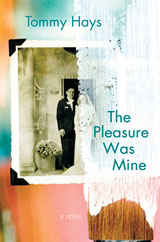 |
“My husband had this, but if you’re like me, everybody gives you their war stories, so I’ll save you mine,” a waitress tells the often cantankerous Prate Marshbanks in Tommy Hays’ new novel, The Pleasure Was Mine (St. Martin’s Press, 2005).
The waitress adds, “I will say this — it wasn’t all bad.”
Which is a pretty fair mirror of Hays’ take on Alzheimer’s Disease and the lives it transforms. Pleasure manages to be sweet, funny, sensitive, and — perhaps most surprisingly — hopeful.
Telling it like it is
Hays, director of the Great Smokies Writers Program at UNCA, started his study of Alzheimer’s when his own father was diagnosed with the disease about seven years ago.
“It was a really weird time, because he knew stuff and then he didn’t know stuff,” the author recalls during a phone interview. “I started a memoir and wrote about 300 pages, but it got overwhelming trying to document it.”
So, Hays switched to what would become his third novel, based on the experiences and emotions he’d gone through with his father.
Pleasure is the story of Prate, an aging house painter, who — 50 years ago — married Irene, the local It Girl.
“How in the world did a tall, thin, fair-skinned beauty and one of the most respected high school English teachers in all of Greenville County, in all of South Carolina for that matter, wind up married to a short, dark, fat-faced, jug-eared house painter — a high school dropout, who when he first heard of semicolons, figured they had something to do with digestion,” Prate muses in the book’s opening paragraphs.
In fact, to some extent, this antisocial grump blames his shortcomings for his spouse’s decline. Unable to care for her himself, Prate is forced to put Irene into a nursing home, and his life quickly becomes a routine of looking after his declining wife even as she forgets who he is.
More grumpy old men
That all sounds pretty gloomy, but Hays picks up the pace with Prate’s caustic commentary.
“I’d always had that voice in my head,” the writer says, explaining that his main character is based on a bachelor uncle.
But inspiration also rose from within. “I feel like an old man, and I’m pretty cranky,” Hays admits. “Jackson didn’t let go,” Prate grumbled about a hug from his grandson, “and I’ll be damned if about that same time one of those cats didn’t jump in my lap like it knew — with that boy hanging on to me — there wasn’t a damned thing in the world I could do except pet it.”
It’s actually Jackson who brings a real change into Prate’s life. When Newell, the old man’s widowed son — a landscape painter — gets a fellowship to Penland for the summer, he leaves his young boy with Prate.
At first, the unwilling grandfather complains that he has no idea what to do with a kid in tow, but the two soon find common ground, mainly in visiting Irene.
Love in a time of Alzheimer’s
Perhaps the biggest surprise of Pleasure is that it’s a love story. There’s romantic intrigue around Newell, the heartbroken artist. There’s a strengthening bond between grandson and grandfather. And there’s Billie, the well-meaning neighbor, who elbows her way into the Marshbanks family.
But the most important relationship of the book remains that between Prate and Irene.
“We define somebody by how they know us,” says Hays. “If there’s this [disease] where we don’t know if they know us … with a marriage, it’s that much more intense.” He cites a local doctor who explained to him how relationships evolve with the disease. “That was kind of informing about the book,” Hays reveals.
So, even as Irene careens in and out of lucidity, sometimes mistaking her husband for her father or brother, both characters are still faced with their emotional and sexual needs. And Hays meets these tricky issues head-on.
“We think of old people as just sitting around watching TV and not having that kind of intimacy anymore,” he says. “I think that’s just wrong.”
Pleasure, in many ways, goes beyond “just” a story of loss. Though more bitter than sweet, it nevertheless recounts life’s changes in a way that allows good and bad to coexist.
“One of the things I tried to get across is that even with the loss of so much, Irene still had her dignity. I saw that with my dad: Just when you’d think he was so out of it, he’d come out with a real zinger.”
The author delivers a zinger of his own when he declares: “The thing is — Alzheimer’s isn’t all depressing.”
Tommy Hays reads and discusses The Pleasure Was Mine at Malaprop’s Bookstore (55 Haywood St.) on Sunday, April 10. 3 p.m. Free. 254-6734.



Before you comment
The comments section is here to provide a platform for civil dialogue on the issues we face together as a local community. Xpress is committed to offering this platform for all voices, but when the tone of the discussion gets nasty or strays off topic, we believe many people choose not to participate. Xpress editors are determined to moderate comments to ensure a constructive interchange is maintained. All comments judged not to be in keeping with the spirit of civil discourse will be removed and repeat violators will be banned. See here for our terms of service. Thank you for being part of this effort to promote respectful discussion.